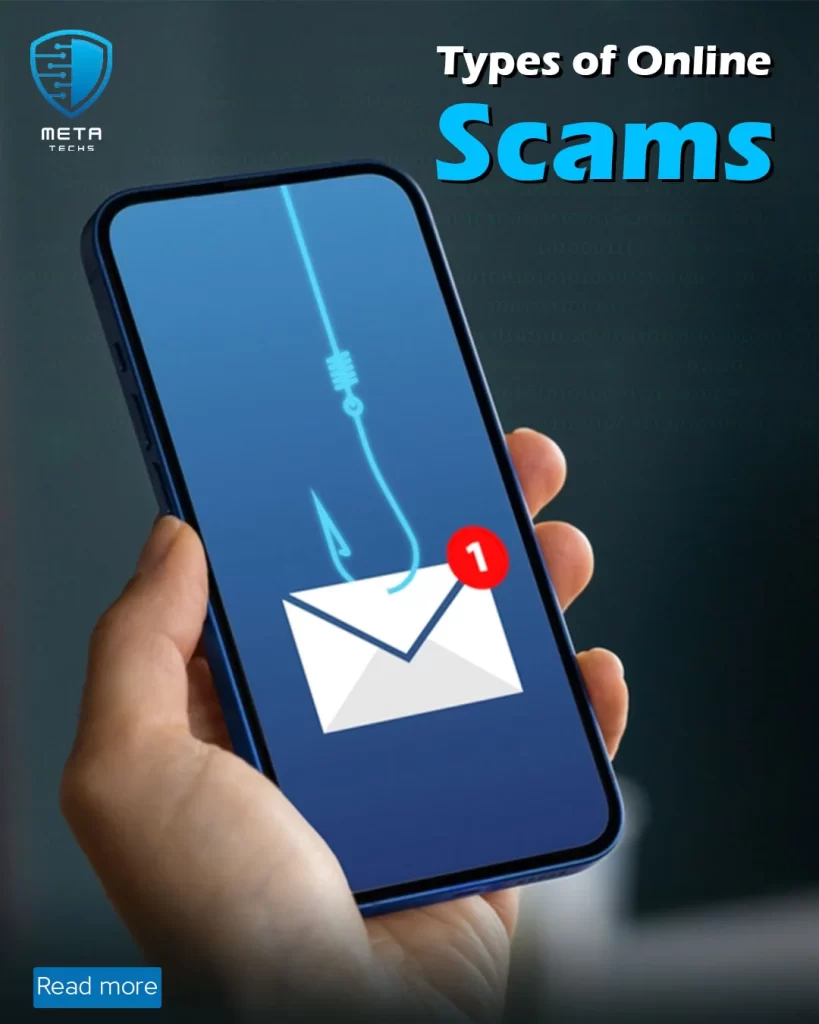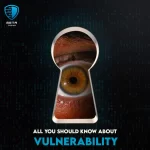Many types of online scams have become increasingly prevalent and sophisticated, targeting individuals across all demographics. It’s crucial to be aware of the various types of scams, including phishing and fraud, and take proactive measures to safeguard yourself. This article will delve into the most common online scams and offer valuable insights on how to identify and steer clear of them.

What are online scams?
Online scams are tricks or schemes that dishonest people use on the internet to cheat others. These scams can happen through emails, messages, websites, or social media. The scammers pretend to be someone trustworthy, like a bank or a popular website, to trick people into giving them money or personal information. They may promise big rewards, like winning a prize or getting a job, but it’s all a lie to steal from people. Online scams can look real, but they are designed to trick you. They often ask for your personal details, like your bank account number, passwords, or credit card information. Once scammers have this information, they can steal your money or even your identity. It’s important to be careful online and not trust everything you see or read, especially if it seems too good to be true. Always verify the source and never give out sensitive information unless you are sure it’s safe.
Types of online scams
Phishing Scams
Phishing scams are one of the most common and widely known internet fraud types. These types of cyber scams involve fraudsters posing as legitimate entities, such as banks, online retailers, or government agencies, with the intention of tricking individuals into revealing sensitive information, such as passwords or credit card details. Phishing scams typically occur through email or instant messaging, where the scammer will use social engineering techniques to create a sense of urgency or fear, compelling the recipient to take immediate action. Once the victim falls into the trap and provides their personal information, the scammer can then use it for fraudulent purposes.
To protect yourself from phishing scams, it is important to be cautious and skeptical of any unexpected emails or messages requesting personal information. Always verify the legitimacy of the sender by independently contacting the supposed organization through their official website or phone number. Additionally, be wary of clicking on suspicious links or downloading attachments from unfamiliar sources, as they may contain malware or viruses.
Identity Theft
Identity theft is a serious and devastating types of online scams that involves the unauthorized use of someone else’s personal information for fraudulent purposes. Scammers can obtain this information through various means, such as hacking into databases, stealing physical documents, or using sophisticated techniques to trick individuals into sharing their personal details. Once scammers gain access to someone’s identity, they can open credit accounts, make unauthorized purchases, or even commit crimes using the victim’s name.
Protecting yourself from identity theft requires taking proactive measures. Safeguard your personal information by using strong and unique passwords for your online accounts, regularly monitoring your financial statements for any suspicious activity, and shredding important documents before disposing of them. It is also advisable to use reputable antivirus software and to be cautious when sharing personal information online, especially on social media platforms.
Lottery and Sweepstakes Scams
Lottery and sweepstakes scams prey on the desire for quick wealth and the allure of winning a large sum of money. Scammers will typically contact individuals through email, phone calls, or social media messages, informing them that they have won a lottery or sweepstakes prize. However, in order to claim the prize, the victim is required to pay a processing fee, taxes, or other charges upfront. Unfortunately, once the victim sends the money, the scammer disappears, leaving the victim empty-handed and out of pocket.
To avoid falling victim to lottery and sweepstakes scams, remember that legitimate lotteries and sweepstakes do not require winners to pay any fees in advance. Be skeptical of unsolicited notifications claiming that you have won a prize and never provide personal information or send money to unknown individuals or organizations. If something seems too good to be true, it probably is.
Investment Scams
Investment scams lure individuals with promises of high returns and guaranteed profits. Scammers will often present themselves as knowledgeable financial advisors or experts, offering exclusive investment opportunities that seem too good to pass up. These scams can take various forms, such as pyramid schemes, Ponzi schemes, or fake investment platforms. The scammers will encourage victims to invest large sums of money, promising substantial returns, but in reality, the money is used to pay off earlier investors or simply disappears into the scammer’s pockets.
Protecting yourself from investment scams requires conducting thorough research before making any investment decisions. Verify the legitimacy of the investment opportunity by checking with regulatory authorities and independent financial advisors. Remember that legitimate investments carry risks, and any promises of guaranteed returns should raise red flags. It is also essential to diversify your investments and never invest more than you can afford to lose.
Job offers scams
on the other hand, involve creating fake job listings to lure people who are actively seeking employment or work-from-home opportunities. These fabricated job listings often promise high pay for minimal effort and are typically posted on legitimate job websites like LinkedIn and Indeed. The scammers may even create fake websites to make their scams appear more legitimate. Once a victim applies for the fake job and accepts it, the cybercriminal can easily obtain their personal information by simply requesting it.
To avoid types of online scams like job offer scams, exercise caution when dealing with unknown employers or recruitment agencies. Research the company thoroughly and independently verify their legitimacy through official channels. Be skeptical of job offers that require upfront payments or ask for personal information, such as your Social Security number, before you have been formally hired. Additionally, trust your instincts and be wary of job offers that seem too good to be true.
Incorrect Label Scam
One way to protect yourself from an incorrect label scam is by closely monitoring your tracking information. Once your package shows as delivered, it’s a strong sign that it’s meant for you. Compare the weight of the package with the weight provided in the tracking details. If they match up, it’s likely that the package is indeed yours. It’s also a good practice to take a photo of both the shipping label and the package itself before opening it. This way, you have visual evidence in case any issues arise later on.
Additionally, stay vigilant for any discrepancies in the delivery process. If the package arrives but under a different name than expected, take immediate action. Contact the seller or the shipping carrier to inquire about the situation. Provide them with the tracking information and any other relevant details to clarify the situation and ensure that the package reaches its intended recipient.
Moreover, be cautious when dealing with sellers who use generic or ambiguous shipping labels. Legitimate businesses typically use clear and specific shipping labels with accurate recipient information. If you notice anything suspicious or unusual about the shipping label, proceed with caution and verify the sender’s authenticity before proceeding with the transaction.
Social media scams
Social media scams operate in a similar manner, where scammers use social media platforms to post fake promotions, send malicious links, or impersonate legitimate accounts in order to steal personal information. These scams can be found in a user’s newsfeed or direct messages, where the scammer convinces the victim to click on a malicious link or share their personal information.
Protecting yourself from social media scams requires maintaining a healthy level of skepticism. Be cautious when accepting friend requests or engaging with unfamiliar individuals on social media. Avoid clicking on suspicious links or sharing personal information publicly. It is also advisable to review and adjust your privacy settings on social media platforms to limit the information visible to others.
Another types of online fraud’s attack is scareware, which utilizes psychological manipulation to trick victims into downloading malware onto their devices. This is often done through pop-up ads that claim the victim’s device is infected with a virus and prompts them to download antivirus software. However, by clicking on the pop-up, the victim unknowingly downloads malware instead. Operate in a similar manner, where scammers use social media platforms to post fake promotions, send malicious links, or impersonate legitimate accounts in order to steal personal information. These scams can be found in a user’s newsfeed or direct messages, where the scammer convinces the victim to click on a malicious link or share their personal information.
learn more about: All you need to know about deepfake cfo hong kong
eBay counterfeit scam
Be cautious when buying on eBay, especially from links shared on social media. Sometimes, scammers take over people’s accounts and post fake listings. Check a seller’s reviews carefully, as scammers often start by selling cheap items to boost their ratings before trying to sell expensive fakes. If a designer item is priced way below its normal value, it’s likely fake. Use a reverse image search to check if the seller is using stock or stolen photos. Ask for a certificate of authenticity for designer items and verify the serial code online. Look for eBay’s Authenticity Guarantee checkmark for added assurance that the item is genuine.
Scholarship and grant scams
Scholarship and grant scams are a concerning issue, especially for students and parents navigating the costs of higher education. It’s essential to approach unsolicited scholarship and grant offers with skepticism and caution.
Scammers often target individuals with promises of scholarships or grants that seem too good to be true. Their goal may range from identity theft to charging fees for supposed insider information about exclusive scholarships or hidden funds.
Here are some red flags to watch out for:
Guaranteed Money: Be wary of offers that guarantee you’ll receive a scholarship or grant. Legitimate scholarships are competitive, and no one can guarantee you will receive funding.
Fees for Information: Avoid scholarships or grants that require upfront fees for access to information or application forms. Legitimate opportunities do not charge fees for applying.
Special or Exclusive Scholarships: Be cautious of scholarships that claim to be exclusive or available only through a specific fund. Verify the legitimacy of such claims before proceeding.
To protect yourself:
Research: Verify the legitimacy of scholarships and grants through trusted sources, such as official government websites, reputable financial aid offices, or recognized scholarship databases.
No Upfront Fees: Avoid scholarships or grants that require payment or fees for application forms, processing, or access to information.
Webcam security
Webcam security has become a significant concern, especially during the pandemic when online activities like Zoom classes and social interactions have surged. Unfortunately, the increased use of webcams has also led to a rise in fraudulent activities, particularly involving hackers infiltrating unprotected webcams.
One of the primary risks is hackers gaining unauthorized access to webcams that are not covered or disabled. Once they access a webcam, they can collect sensitive information and images, which they may then use for blackmail purposes against teens and their parents. This type of scam can have serious consequences, including emotional distress and privacy violations.
To protect against webcam security threats, Cover Your Webcam When not in use, cover your webcam with a physical cover or tape to prevent unauthorized access. Many hackers exploit vulnerabilities in webcam software to gain access remotely. Use Secure Software Ensure that your webcam software is up to date with the latest security patches and use reputable antivirus software to detect and prevent malware that could compromise your webcam. Be Mindful of Links Avoid clicking on suspicious links or downloading attachments from unknown sources, as these could contain malware designed to access your webcam.
How to identify online scams and avoid phishing scams
Identifying types of online scams requires vigilance, as scammers utilize a variety of tactics to deceive. Being aware of common red flags is essential in protecting oneself from becoming a victim.
- Unsolicited requests Exercise caution with unsolicited emails, messages, or calls requesting personal or financial information. Legitimate organizations typically do not solicit sensitive details through these channels, making such requests a clear red flag for phishing scams.
- Poor grammar and spelling Pay attention to the quality of the communication. Many scammers operate from non-English speaking countries, resulting in grammatical errors and misspellings in their messages.
- Too good to be true offers If an offer seems too good to be true, it probably is. Exercise caution when encountering deals or opportunities that promise extraordinary returns or prizes, a common tactic in scams.
- URL verification Before clicking on any links, hover your cursor over them to preview the URL. Scammers often use deceptive links that appear legitimate but redirect to fraudulent websites, a classic phishing technique.
- Trust your instincts If something feels off or suspicious, trust your gut instinct. It is better to be safe than sorry.
learn more about: how can you protect your home computer cyber security
what to do if you have been scammed online
- Do not click on suspicious links Avoid clicking on links in emails or messages from unknown sources. Instead, manually type the URL of the website you want to visit or use a trusted search engine to steer clear of phishing scams.
- Verify the sender’s identity If you receive an email from an organization requesting personal information, contact them directly through their official website or phone number to confirm the legitimacy of the request, a prudent step to avoid phishing emails.
- Keep software up to date Regularly update your operating system, antivirus software, and other applications to ensure protection against known vulnerabilities that scammers may exploit, enhancing your cyber security.
- Use strong and unique passwords Create strong, complex passwords for your online accounts and avoid reusing the same password across multiple platforms. Consider using a password manager for added online security.
- Enable two-factor authentication Two-factor authentication adds an extra layer of security by requiring a second form of verification, such as a verification code sent to your mobile device, in addition to your password.
Reporting online scams in UAE
If you encounter different types of online fraud or become a victim in the UAE, it is crucial to report it to the relevant authorities. The UAE’s Cybercrime Department and Telecommunications Regulatory Authority (TRA) have established channels for reporting online scams and cybercrime incidents. Contacting these authorities will help them investigate and take appropriate action against the scammers, as well as prevent others from falling victim to similar scams.
Meta tech can protect your company from scams
In addition to individual protection, businesses should also take proactive measures to safeguard themselves from types of online scams. Implementing cyber security solutions, such as advanced firewalls, intrusion detection systems, and secure network protocols, can significantly enhance a company’s security posture. These technologies can help detect and prevent cyber-attacks, including online scams before they can cause harm. At Meta Techs, we offer a range of services to help businesses protect their valuable assets and sensitive information from scams and cyber threats.
Conclusion
In conclusion, online scams have become a pervasive threat in the digital age. It is essential to stay informed about types of online scams, vigilant, and cautious when navigating the online world. By understanding the different types of scams, learning how to identify them, and implementing preventive measures, we can protect ourselves and our businesses from falling victim to these fraudulent activities. Remember, staying safe online requires constant awareness, skepticism, and the use of reliable security measures.
Meta Techs can help protect your company from scams and cyber threats. Contact us today to explore our meta tech services and safeguard your business’s online presence.







![Rapid7 Vulnerability Management]](https://meta-techs.net/wp-content/uploads/2025/03/What-is-Rapid7-Vulnerability-Management-1.webp)
